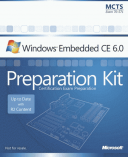Книга: Microsoft Windows Embedded CE 6.0 Exam Preparation Kit
User-Mode Drivers Registry Settings
User-Mode Drivers Registry Settings
On Windows Embedded CE 6.0, you can run multiple user-mode drivers in a single host process or have multiple host processes enabled on the system. Drivers grouped in a single Udevice.exe instance share the same process space, which is particularly useful for drivers that depend on each other. However, drivers in the same process space can affect each other's stability. For example, if a user-mode driver causes the host process to fail, all drivers in that host process fail. The system continues to function except for the affected drivers and applications accessing these drivers, yet it is possible to recover from this situation by reloading the drivers, if the applications support it. If you isolate a critical driver in a separate user mode driver host process, you can increase the overall system stability. By using the registry entries listed in Table 6-5, you can define individual host process groups.
Table 6-5 Registry entries for user-mode driver host processes
| Registry Entry | Type | Description |
|---|---|---|
| HKEY_LOCAL_MACHINEDriversProcGroup_### | REG_KEY | Defines a three-digit group ID (###) for a user-mode driver host process, such as ProcGroup_003, which you can then specify in the UserProcGroup entry in a driver's registry key, such as UserProcGroup=3. |
| ProcName | REG_SZ | The process that the Reflector service starts to host the user-mode driver, such as ProcName=Udevice.exe. |
| ProcVolPrefix | REG_SZ | Specifies the file system volume that the Reflector service mounts for the user-mode driver host process, such as ProcVolPrefix=$udevice. The specified ProcVolPrefix replaces the $device volume in driver device names. |
Having defined the desired host process groups, you can associate each user-mode driver with a particular group by adding the UserProcGroup registry entry to the device driver's registry subkey (see Table 6-3 earlier in this lesson). By default, the UserProcGroup registry entry does not exist, which corresponds to a configuration in which Device Manager loads every user-mode driver into a separate host process instance.
- Registry Settings to Load Device Drivers
- Kernel-Mode and User-Mode Drivers
- User-Mode Drivers and the Reflector Service
- Chapter 15. Graphical User Interfaces for Iptables
- User-land setup
- Compiling the user-land applications
- User specified chains
- User-land states
- Setting up user specified chains in the filter table
- Для чего нужны папки Windows, Documents and Settings, Program Files и Temp?
- После переустановки Windows нет доступа к папке Мои документы или нельзя удалить оставшуюся от старой системы папку Docu...
- 9.5.3. Маленький секрет User Agent




